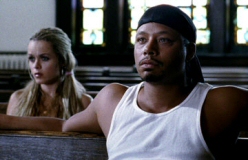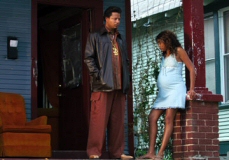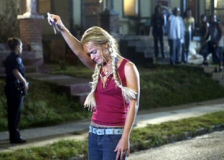Hustle & Flow (Craig Brewer, 2005)
 American films that are perceptive about
class issues are too few and far between, probably because they tend not to be
audience favorites, so it’s quite surprising to find that Craig Brewer’s Hustle
& Flow, which won the Audience Award at this year’s Sundance Film
Festival, examines a particularly desperate American dream from a decidedly
middle-aged perspective. Made with enough grit and determination to make you
forget the clichés of the underdog genre most of the time that you’re
watching, Hustle & Flow does much to restore one’s faith in this
brand of formula filmmaking. From the start, we’re confronted with lead
character Djay’s (Terrance Howard) humanity and unpredictability in a way that
makes it impossible to pigeonhole him as we watch him try to transform himself
from pimp to rap star. Despite the fact that he’s a small-time player who’s
always a hair’s breadth away from abusing the women in his life, we can’t
escape the fact that he cares deeply for those same women. It’s with equal
parts habit and necessity with which he exploits them. It initially seems an
oversight that Brewer never shows Djay having sex with any of these woman, but
as the film develops, it becomes apparent that it’s more than sexual desire
that’s holding them together. Djay may be a pimp by vocation, but he’s
clearly not a pimp at heart. His desire to overcome his occupation, which he’s
adopted due to financial necessity, becomes the movie’s prime motivating
force, and it takes on surprising urgency, considering the fact that most of us
would consider Djay a hopeless lowlife if we had to deal with him in person.
American films that are perceptive about
class issues are too few and far between, probably because they tend not to be
audience favorites, so it’s quite surprising to find that Craig Brewer’s Hustle
& Flow, which won the Audience Award at this year’s Sundance Film
Festival, examines a particularly desperate American dream from a decidedly
middle-aged perspective. Made with enough grit and determination to make you
forget the clichés of the underdog genre most of the time that you’re
watching, Hustle & Flow does much to restore one’s faith in this
brand of formula filmmaking. From the start, we’re confronted with lead
character Djay’s (Terrance Howard) humanity and unpredictability in a way that
makes it impossible to pigeonhole him as we watch him try to transform himself
from pimp to rap star. Despite the fact that he’s a small-time player who’s
always a hair’s breadth away from abusing the women in his life, we can’t
escape the fact that he cares deeply for those same women. It’s with equal
parts habit and necessity with which he exploits them. It initially seems an
oversight that Brewer never shows Djay having sex with any of these woman, but
as the film develops, it becomes apparent that it’s more than sexual desire
that’s holding them together. Djay may be a pimp by vocation, but he’s
clearly not a pimp at heart. His desire to overcome his occupation, which he’s
adopted due to financial necessity, becomes the movie’s prime motivating
force, and it takes on surprising urgency, considering the fact that most of us
would consider Djay a hopeless lowlife if we had to deal with him in person.
 The fact that Djay’s best hope to
break out of his stasis lies with another black man ensures that the audience
realizes that the film is portraying a class struggle instead of one that
centers on his race. Complex, layered performances from the entire ensemble
(Henson, Anderson and Manning deserve top honors), filled with self-effacing
humor and true desperation ratchet the movie’s believability that wouldn’t
seem likely given the movie’s simplistic sounding plot description. Producer
John Singleton’s own Baby Boy (which
featured an even better performance from Henson) similarly intelligently
examined the moral crises created by the limited options available to poor
African-American men. The decision to make Djay’s vocation such a
self-defeating, demeaning one only intensifies the position that all of these
characters are in. One might complain that the movie seems contrived in its
machinations to make everyone, with the exception of unsupportive stripper Lexus
(who’s, critically, self-sufficient enough to be able to reject Djay’s
dream), participate in the creation of the demo tape. That would unfairly
discount the skill with which Brewer’s script details those scenes, however.
Surprising detail is paid to the recording process, giving the audience a true
appreciation for how the music is created, and though we hear a scattered hint
or two about Djay’s musical past, what’s impressive here is the way that
Howard makes us believe that it’s his character’s life experience that has
turned him into a writer.
The fact that Djay’s best hope to
break out of his stasis lies with another black man ensures that the audience
realizes that the film is portraying a class struggle instead of one that
centers on his race. Complex, layered performances from the entire ensemble
(Henson, Anderson and Manning deserve top honors), filled with self-effacing
humor and true desperation ratchet the movie’s believability that wouldn’t
seem likely given the movie’s simplistic sounding plot description. Producer
John Singleton’s own Baby Boy (which
featured an even better performance from Henson) similarly intelligently
examined the moral crises created by the limited options available to poor
African-American men. The decision to make Djay’s vocation such a
self-defeating, demeaning one only intensifies the position that all of these
characters are in. One might complain that the movie seems contrived in its
machinations to make everyone, with the exception of unsupportive stripper Lexus
(who’s, critically, self-sufficient enough to be able to reject Djay’s
dream), participate in the creation of the demo tape. That would unfairly
discount the skill with which Brewer’s script details those scenes, however.
Surprising detail is paid to the recording process, giving the audience a true
appreciation for how the music is created, and though we hear a scattered hint
or two about Djay’s musical past, what’s impressive here is the way that
Howard makes us believe that it’s his character’s life experience that has
turned him into a writer.
 Quite deservedly, there’s much
critical buzz about Terrance Howard’s unimpeachable characterization, but one
of the prime strengths of Hustle & Flow’s script is the way it
provides him opportunities to shift his persona as he speaks with the other
characters, each of whom is presented with a rock-solid performance. For
example, Anthony Anderson’s likable, but not simple, role as Key, Djay’s
slightly more affluent producer, helps us to better understand Djay’s
motivations. In the scenes they share, it becomes obvious that despite the
differences in their current economic state, they both are flailing desperately
for a way out of it. Key’s mildly condescending attitude toward Djay is
overrode by his hopes, against any common sense, that Djay is the ticket to a
better life. Though the movie details the process as they chase their dream, it
doesn’t glamorize that process as much as it might because Brewer realizes the
extent to which the odds are stacked against these people, which only reinforces
the feeling that any success they find is a fluke. The palpable, sultry Memphis
climate is perhaps the biggest oppressor of all here, and thanks to its
omnipresence (courtesy of Amy Vincent’s excellent cinematography – which
also won an award at Sundance), it becomes a metaphor of sorts for the larger,
largely unspoken social issues that ensure there will be more failures than
success stories in situations like this one. Like so many of Hustle &
Flow’s strong points, though, this point is made without sacrificing
audience’s desire to be entertained.
Quite deservedly, there’s much
critical buzz about Terrance Howard’s unimpeachable characterization, but one
of the prime strengths of Hustle & Flow’s script is the way it
provides him opportunities to shift his persona as he speaks with the other
characters, each of whom is presented with a rock-solid performance. For
example, Anthony Anderson’s likable, but not simple, role as Key, Djay’s
slightly more affluent producer, helps us to better understand Djay’s
motivations. In the scenes they share, it becomes obvious that despite the
differences in their current economic state, they both are flailing desperately
for a way out of it. Key’s mildly condescending attitude toward Djay is
overrode by his hopes, against any common sense, that Djay is the ticket to a
better life. Though the movie details the process as they chase their dream, it
doesn’t glamorize that process as much as it might because Brewer realizes the
extent to which the odds are stacked against these people, which only reinforces
the feeling that any success they find is a fluke. The palpable, sultry Memphis
climate is perhaps the biggest oppressor of all here, and thanks to its
omnipresence (courtesy of Amy Vincent’s excellent cinematography – which
also won an award at Sundance), it becomes a metaphor of sorts for the larger,
largely unspoken social issues that ensure there will be more failures than
success stories in situations like this one. Like so many of Hustle &
Flow’s strong points, though, this point is made without sacrificing
audience’s desire to be entertained.
66
07.28.05
Jeremy Heilman